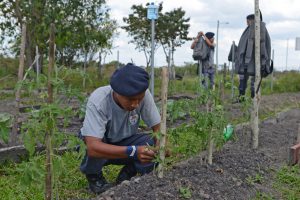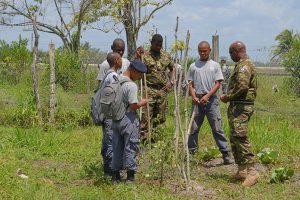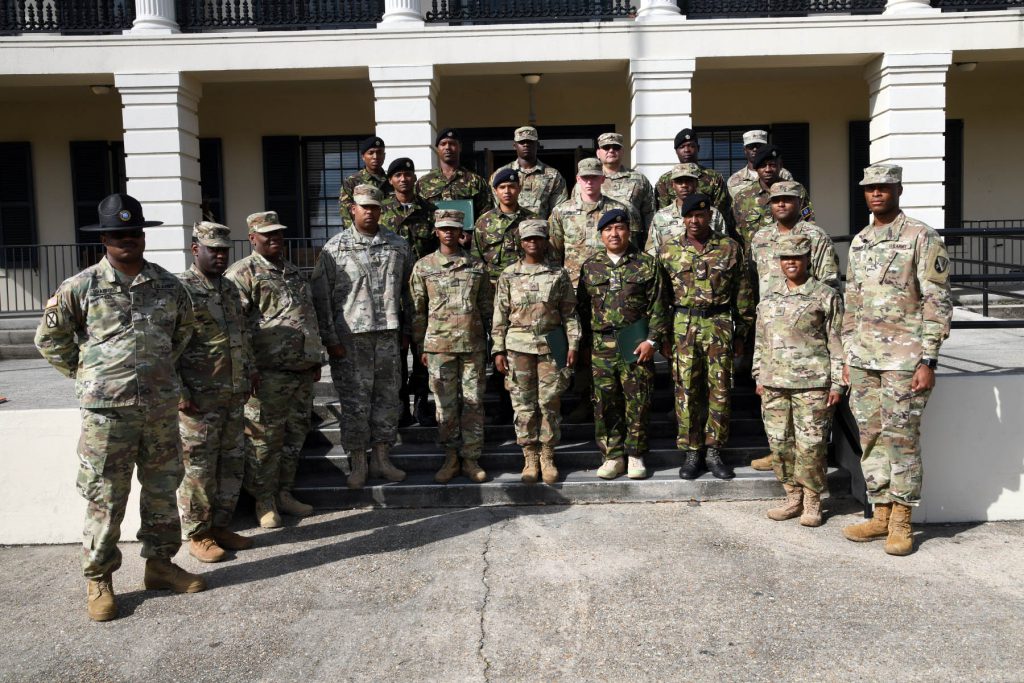By Sgt. Noshoba Davis, Louisiana National Guard Public Affairs Office

PINEVILLE, La. – The Louisiana National Guard’s Youth Challenge Program welcomed cadre from Belize’s Youth Challenge Program to attend the Challenge Program Instruction Course at Gillis W. Long Center in Carville, March 31-April 13. The Belize Defence Force recently took over the Belize program for at-risk youth that is similar to the program in Louisiana.
For more than 20 years, the LANG and the BDF have trained and worked together as part of the State Partnership Program, which is administered by the National Guard Bureau. Over the years, the two countries have participated in over 250 events and has led to several training opportunities in addition to YCP cross-training.
“I’ve been in the military for the past 13 years. I was in the infantry and an engineering company before I was selected to be a part of the cadre in Belize,” said BDF Cpl. Shack Roberto. “Coming here has been a good experience for us. It has been a privilege to learn what they (LANG YCP cadre) know about teaching kids.”
Official delegates in Belize and the BDF have worked with the LANG over the past several years to gain an understanding of how the alternative education program, which offers at-risk youth an opportunity to change their future outside of a traditional school setting, works.
The BDF and the Ministry of Human Development are responsible for running Belize’s YCP. The program in Belize is a two-phase program for the cadets. Cadets go through a residential phase and then move off post and are paired with a mentor and given a care plan based on what each cadet wants to accomplish after graduation.
“Our program is open to young men ages 15-17. These young men must be Belizean, have no major charges or been to prison and have no cases before the courts,” said Anthony Castillo, of the Ministry of Human Development. “The young men must also be in good health and have a willingness to attend the program.”
The Belize Department of Defense and Ministry of human development incorporated teaching life skills to the cadets like the LANG’s YCP, but chose life skills that will benefit the young men in their country such as hospitality, agriculture and woodworking.
For some, like Delrick Sankey, this is the first time some cadets have had cook, plant crops or do skilled labor like woodworking.
“It was difficult at first because it’s not my background. I let the cadets who know how to do it teach me, as these skills are important to have in a third world country,” said Sankey. “These skills give me the knowledge to do something myself and be more self-efficient in my own home.”
While learning discipline from their cadre, cadets also learn about drug abuse, health concerns, how apply for a job and professionalism needed in a work place.
Sankey explained this course is his second chance in life and that seeing the discipline in the Soldiers has shown him where he wants to go in life.
“I was 14 when I got involved with a gang and got into some trouble,” said Sankey. “I was ashamed of

myself, and wanted to change my attitude, so I asked my mom to come here.”
The cadre for the Belize YCP are Soldiers from the BDF. These cadre are trained with the cadre for the LANG’s YCP at the Challenge Program Instructor Course in Louisiana.
“This training has helped our cadre out tremendously,” said Castillo. “The cadre learn how to work with the kids in a way that we can discipline and mold them into upstanding citizens of the community. Our cadre are learning how to understand and empathize with the cadets, different ways to enforce discipline and how to handle a number of different situations from the LANG’s YCP course.”
Louisiana and Belize have expanded their relationship beyond traditional SPP exchanges to include combined leadership training opportunities and academic professional development.
“We are very grateful for the partnership with Louisiana and the training they provide to not only the Soldiers in the BDF, but our cadre at this course as well,” said Castillo. “The training provided to our cadre is valuable to us and makes a great difference for us.”
The purpose of the SPP is to foster mutual interests and establish habitual long-term relationships across all levels of society. The program as a whole encourages the development of economic, political and military ties between the states and partner nations. There are 76 countries across the globe partnered with 70 unique security partnerships.






